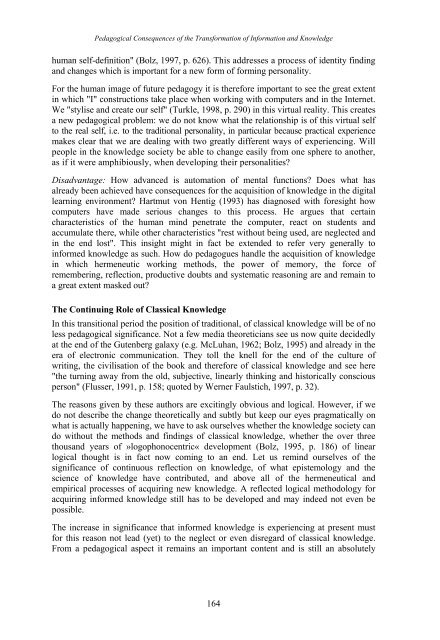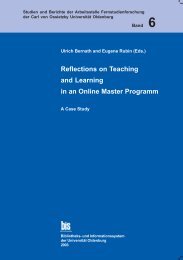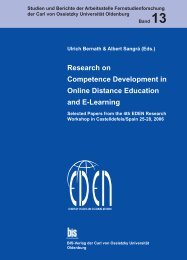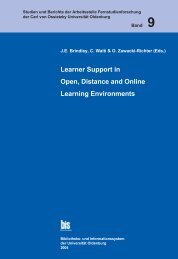Distance Education in Transition - Master of Distance Education ...
Distance Education in Transition - Master of Distance Education ...
Distance Education in Transition - Master of Distance Education ...
You also want an ePaper? Increase the reach of your titles
YUMPU automatically turns print PDFs into web optimized ePapers that Google loves.
Pedagogical Consequences <strong>of</strong> the Transformation <strong>of</strong> Information and Knowledge<br />
human self-def<strong>in</strong>ition" (Bolz, 1997, p. 626). This addresses a process <strong>of</strong> identity f<strong>in</strong>d<strong>in</strong>g<br />
and changes which is important for a new form <strong>of</strong> form<strong>in</strong>g personality.<br />
For the human image <strong>of</strong> future pedagogy it is therefore important to see the great extent<br />
<strong>in</strong> which "I" constructions take place when work<strong>in</strong>g with computers and <strong>in</strong> the Internet.<br />
We "stylise and create our self" (Turkle, 1998, p. 290) <strong>in</strong> this virtual reality. This creates<br />
a new pedagogical problem: we do not know what the relationship is <strong>of</strong> this virtual self<br />
to the real self, i.e. to the traditional personality, <strong>in</strong> particular because practical experience<br />
makes clear that we are deal<strong>in</strong>g with two greatly different ways <strong>of</strong> experienc<strong>in</strong>g. Will<br />
people <strong>in</strong> the knowledge society be able to change easily from one sphere to another,<br />
as if it were amphibiously, when develop<strong>in</strong>g their personalities?<br />
Disadvantage: How advanced is automation <strong>of</strong> mental functions? Does what has<br />
already been achieved have consequences for the acquisition <strong>of</strong> knowledge <strong>in</strong> the digital<br />
learn<strong>in</strong>g environment? Hartmut von Hentig (1993) has diagnosed with foresight how<br />
computers have made serious changes to this process. He argues that certa<strong>in</strong><br />
characteristics <strong>of</strong> the human m<strong>in</strong>d penetrate the computer, react on students and<br />
accumulate there, while other characteristics "rest without be<strong>in</strong>g used, are neglected and<br />
<strong>in</strong> the end lost". This <strong>in</strong>sight might <strong>in</strong> fact be extended to refer very generally to<br />
<strong>in</strong>formed knowledge as such. How do pedagogues handle the acquisition <strong>of</strong> knowledge<br />
<strong>in</strong> which hermeneutic work<strong>in</strong>g methods, the power <strong>of</strong> memory, the force <strong>of</strong><br />
remember<strong>in</strong>g, reflection, productive doubts and systematic reason<strong>in</strong>g are and rema<strong>in</strong> to<br />
a great extent masked out?<br />
The Cont<strong>in</strong>u<strong>in</strong>g Role <strong>of</strong> Classical Knowledge<br />
In this transitional period the position <strong>of</strong> traditional, <strong>of</strong> classical knowledge will be <strong>of</strong> no<br />
less pedagogical significance. Not a few media theoreticians see us now quite decidedly<br />
at the end <strong>of</strong> the Gutenberg galaxy (e.g. McLuhan, 1962; Bolz, 1995) and already <strong>in</strong> the<br />
era <strong>of</strong> electronic communication. They toll the knell for the end <strong>of</strong> the culture <strong>of</strong><br />
writ<strong>in</strong>g, the civilisation <strong>of</strong> the book and therefore <strong>of</strong> classical knowledge and see here<br />
"the turn<strong>in</strong>g away from the old, subjective, l<strong>in</strong>early th<strong>in</strong>k<strong>in</strong>g and historically conscious<br />
person" (Flusser, 1991, p. 158; quoted by Werner Faulstich, 1997, p. 32).<br />
The reasons given by these authors are excit<strong>in</strong>gly obvious and logical. However, if we<br />
do not describe the change theoretically and subtly but keep our eyes pragmatically on<br />
what is actually happen<strong>in</strong>g, we have to ask ourselves whether the knowledge society can<br />
do without the methods and f<strong>in</strong>d<strong>in</strong>gs <strong>of</strong> classical knowledge, whether the over three<br />
thousand years <strong>of</strong> »logophonocentric« development (Bolz, 1995, p. 186) <strong>of</strong> l<strong>in</strong>ear<br />
logical thought is <strong>in</strong> fact now com<strong>in</strong>g to an end. Let us rem<strong>in</strong>d ourselves <strong>of</strong> the<br />
significance <strong>of</strong> cont<strong>in</strong>uous reflection on knowledge, <strong>of</strong> what epistemology and the<br />
science <strong>of</strong> knowledge have contributed, and above all <strong>of</strong> the hermeneutical and<br />
empirical processes <strong>of</strong> acquir<strong>in</strong>g new knowledge. A reflected logical methodology for<br />
acquir<strong>in</strong>g <strong>in</strong>formed knowledge still has to be developed and may <strong>in</strong>deed not even be<br />
possible.<br />
The <strong>in</strong>crease <strong>in</strong> significance that <strong>in</strong>formed knowledge is experienc<strong>in</strong>g at present must<br />
for this reason not lead (yet) to the neglect or even disregard <strong>of</strong> classical knowledge.<br />
From a pedagogical aspect it rema<strong>in</strong>s an important content and is still an absolutely<br />
164





